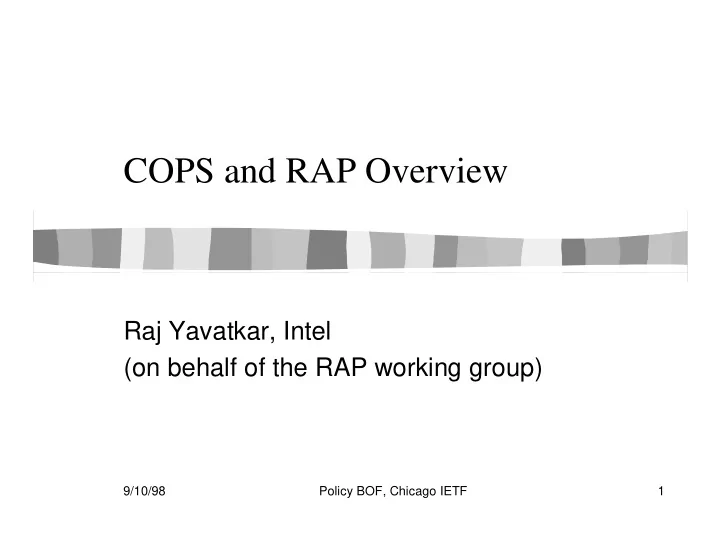

COPS and RAP Overview Raj Yavatkar, Intel (on behalf of the RAP working group) 9/10/98 Policy BOF, Chicago IETF 1
Outline ■ Background on RAP working group ■ COPS Overview ■ Use of COPS with RSVP ■ Use of COPS with Diff-Serv Policy BOF, Chicago IETF 2 9/10/98
Background ■ RAP working group – Specify a framework for providing policy-based control over QoS admission control decisions – focus on policy-based control over admission control using RSVP – allow for policy-based admission control in other QoS contexts, whenever possible – support for monitoring and accounting – drafts • draft-ietf-rap-framework-01.txt • draft-ietf-rap-cops-02.txt, draft-ietf-rap-cops-ds- 00.txt, draft-ietf-rap-user-identity-00.txt Policy BOF, Chicago IETF 3 9/10/98
Architectural Elements PDP PEP PEP -- Policy Enforcement Point; decisions are enforced here PDP -- makes policy decisions/pushes policy configuration Policy BOF, Chicago IETF 4 9/10/98
Interaction between PEP, PDP ■ Two types of operations performed by PEPs – Outsource decisions • When PEP requires a policy decision, PEP contacts PDP for a policy decision • Request contains policy elements and admission control information (e.g., flowspec). • PDP returns policy decision and additional info – Configuration requests • PDP configures PEP with device-specific policy information Policy BOF, Chicago IETF 5 9/10/98
Topology and Policy Database LDAP COPS PEP PDP Auth. server SNMP • PDP itself may use other services/protocols such as LDAP for accessing policy database, an authentication server for user authentication, SNMP for configuration/mgmt, etc. • PEP always runs on a policy-aware node Policy BOF, Chicago IETF 6 9/10/98
COPS (Common Open Policy Service) ■ A request-response protocol for PEP-PDP interaction – uses TCP for transport – its own Keep-Alives to detect failures – includes a state synchronization mechanism to handle recovery from failures, etc. – PDP can send an asynchronous notification to PEP when policy decision or configured information changes (e.g., preemption) – facilities to report status, stats, monitoring info Policy BOF, Chicago IETF 7 9/10/98
COPS PEP PDP Time Request (handle) Decision (handle) Decision(handle) Policy BOF, Chicago IETF 8 9/10/98
Example of a COPS Session ■ PEP opens a COPS session – specifies ClientType ■ PEP sends requests and receives responses/decisions – a handle associated with each request ■ PDP can send Unsolicited Decisions any time to change previously installed state(s) at PEP ■ PEP sends back report messages to report resource usage and accounting info ■ KeepAlive messages sent when no activity Policy BOF, Chicago IETF 9 9/10/98
Use of COPS with RSVP/Intserv Policy server (PDP) Outsourcing request/response (COPS) RSVP RESV Next hop RSVP router Policy BOF, Chicago IETF 10 9/10/98
Use of COPS with Diff-Serv ■ Edge routers (ERs) rely on BB/PDP to make policy decisions – No explicit e2e signaling to ER to trigger policy decision (ex., IP telephony call setup) – provides a way to configure ERs with a list of packet filters and accompanying actions – provides a way to asynchronously notify ERs about changes to filters/actions – allows ERs to log usage/accounting info Policy BOF, Chicago IETF 11 9/10/98
BB/PDP ER BB/PDP ER BR BR ER Policy BOF, Chicago IETF 12 9/10/98
Use of COPS for Diffserv (contd.) ■ Use the configuration operation in COPS ■ Example of Interaction: – PEP open s COPS session with ClientType=DiffServ – PEP request s a filter list • response: Filter list -- <filter criteria, action>+ • policy tree defined for data format – BB/PDP can update the filter list any time using unsolicited response – PEP notifies BB/PDP of status/usage via report messages Policy BOF, Chicago IETF 13 9/10/98
BB/PDP ER Time Open (ClientType = DiffServ) Request (handle) Response (handle, filter list) Report (handle) Unsolicited Response(handle, chnages) Policy BOF, Chicago IETF 14 9/10/98
Backup Policy BOF, Chicago IETF 15 9/10/98
Points ■ Support for preemption – e.g., remove previously installed reservations ■ Support for many styles of policies – relative priority, bi-lateral, multi-lateral – Scalability: • not necessary to contact PDP at each node ■ Provision for monitoring and accounting ■ Fault tolerance/recovery (PDP failures, partitions and merging, etc.) Policy BOF, Chicago IETF 16 9/10/98
Possible Configurations Network Node LDAP PDP PEP Auth. server SNMP Policy BOF, Chicago IETF 17 9/10/98
Recommend
More recommend